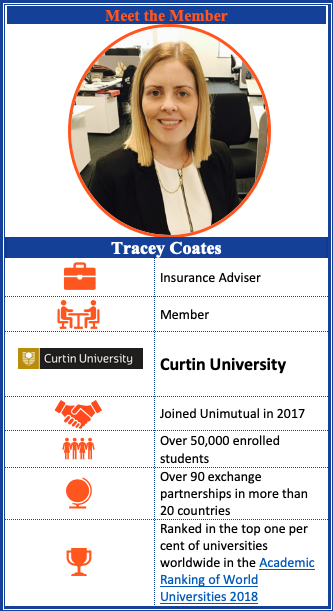
Insurance Market Update August 2019
August 12, 2019
New Unimutual Member – Edith Cowan University
August 19, 2019In these Spotlight discussions, we speak to the individuals that make up the Unimutual community, to share the experiences of the parts that make up the whole.

My name is Tracey Rossi. I work at Curtin University and I am the insurance advisor.
Why did Curtin University join Unimutual?
So Curtin decided to join Unimutual in June 2017 largely because we were with the local WA state government reinsurance fund, RiskCover. We were used to a Mutual. And once we started talking to the Unimutual staff, we really liked the sound of being in a Mutual with other universities and research funds and similar organisations to us who share the same risk exposures, sharing lessons, et cetera.
What does being a Member mean for you?
We’ve really seen the benefits, as I said, from being in a Mutual with other universities and like-minded organisations. We share our risks, our exposures, our claim trends, et cetera. And we really like the risk management work that Unimutual do with their client base. It really helps us to manage our risks and manage our risks well.
Does Unimutual’s risk management work make a difference for you?
For us, we need to do a lot of work around our temperature-controlled environments and fridges and freezers and research infrastructure – cataloguing that stuff, knowing what we’ve got, where we’ve got it, et cetera.
Simon Iliffe is working with us in that space, and he visits our campus in Perth, and he’s assisting us with the tools to assist us to do that large body of work. It’s quite a huge task for us.
What are the consequences of getting something like temperature control wrong?
It’s a large piece of research infrastructure for any university, and a lot of high value, sometimes rare research is kept in TCEs and that can actually result in claims, fires, et cetera, and large losses of research that sometimes researchers have spent years on it. It’s not very easy to just even just lodge a claim for that. It then takes years to recreate that research, et cetera. So we need to get it right in the first instance. It’s not just about financial fallout. It’s about reputation as well.
How has being a Member affected Curtin’s risk management efforts?
I do believe that Curtin is very strong in our risk management approach. We’ve been working hard on that over the years and thankfully we’ve got a lot of engagement within the university to work with us, we’re in the risk and assurance team, so to work with us on organisational risk, strategic risk et cetera, to get it right.
What big risks do you see in the next 5-10 years? How are you managing those?
Like everyone, financial risk is huge for us. You know, we have risks in relation to student numbers, especially international student numbers in WA. Strategically, obviously, they’re looking at ways to, I suppose diversify, the revenue streams, et cetera, engagement with industry, more research-intensive activities.
What sets Unimutual apart from other providers?
Unimutual, obviously being a dedicated university [risk protection provider], that’s the refreshing thing about Unimutual.
“I can call them and just throw something really strange at them, and they’re like, “Yep, we’ve heard that. That’s fine, do this then do this,” or, “It’s covered,” etc.”
So it’s just been really nice to have somebody, especially a [risk protection provider], who understands that risk exposure.
When has being a Member made a notable difference?
The emerging risk reports do really help our organisation. One that sticks in my mind is one that was released about 3D printers, and at the time our library was looking to put a 3D printer in a particular area of the library, and there was a lot of arguments internally between the library staff and health and safety staff, et cetera about if it should happen or shouldn’t happen and the risks. The report that came out from Unimutual really helped our health and safety department to, I suppose, guide the library staff to understand the risk and the exposure that that would give to the university.
We previously spoke to Board Member, Robert Lamont – read his responses here.



